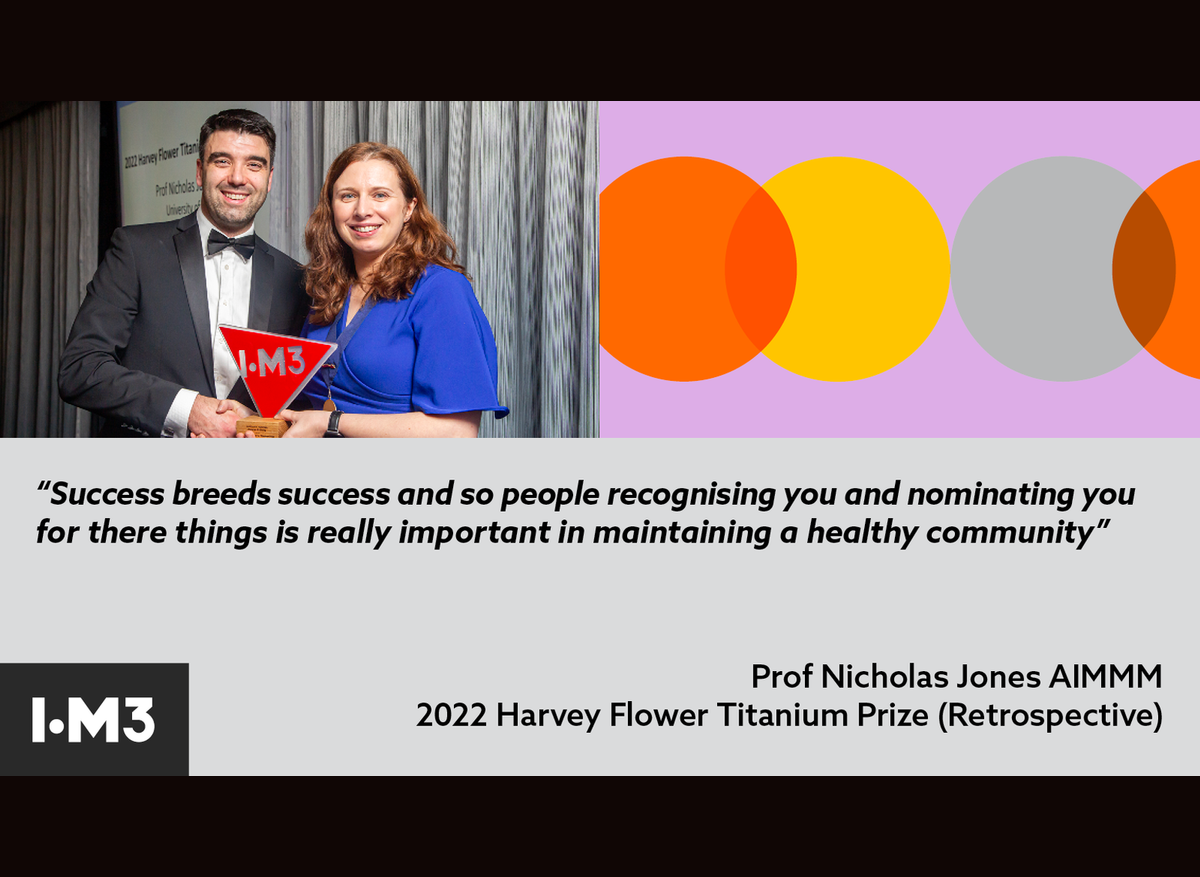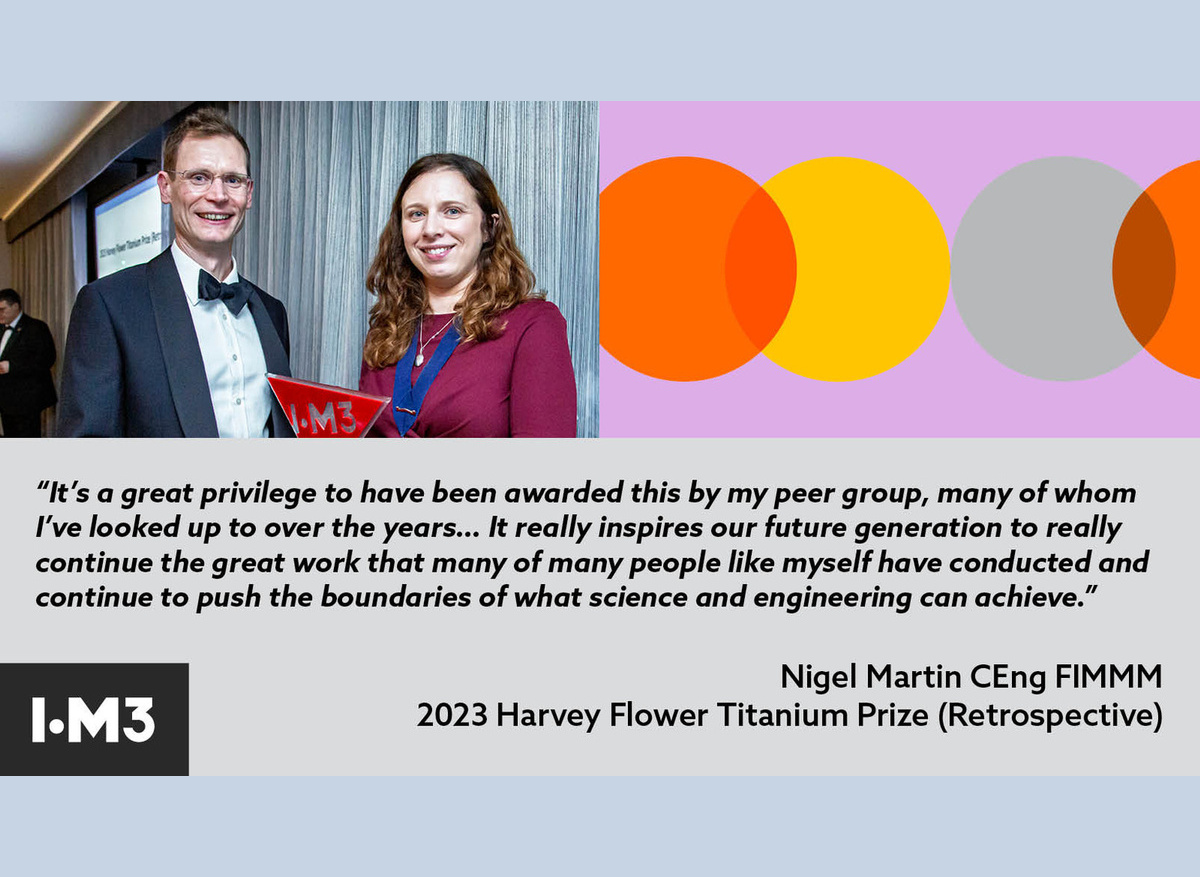Harvey Flower Titanium Prize (Retrospective)
The Harvey Flower Titanium Prize is presented to established researchers and materials engineers in the field.
Successful nominees will have demonstrated most constructive contribution to:
- an improved understanding of titanium metallurgy or alloy development
- a new application for titanium or titanium alloys
- a significant extension of the use of titanium
- enhancement of the performance of titanium in an existing application
- any other scientific or technological innovation or improvement in connection with the production, processing and use of titanium and its alloys.
The winner will receive a trophy.
Award judging
Past winners
2021 -
2024 Mr Nigel Martin CEng FIMMM, 2022 Prof Nicholas G Jones, 2021 Not awarded
1998 - 2020
2020 Dr Thomas B (Ben) Britton CEng CSci FIMMM, 2019 Dr David Harvey ProfGradIMMM, 2018 Dr Kate Fox, 2017 Bill Swale, 2016 Prof Fionn P E Dunne, 2015 Roger Owen Thomas, 2013 Mark Dixon, 2012 Prof Martn Bache, 2011 Brad Wynne, 2010 Adrian Walker, 2009 Dr David Dye, 2008 Prof Xinhua Wu, 2007 Prof William J Evans, 2006 Prof M Winstone, 2005 Not awarded, 2004 M McElhone, D Rugg & C Woodward, 2003 Dr D Hu, 2002 Dr M Jackson, 2001 Dr A Godfrey, 1998 J Dirks
About Professor Harvey M Flower FIMMM FRAeS (1945-2003)
Harvey Flower, Professor of Materials Science at Imperial College, London, died in a tragic accident on 14 August while enjoying a family holiday on the Isle of Wight. He was 58.
Born in 1945, Harvey was educated at St Dunstan's Schol, Catford (1953-1963) where he excelled in chemistry and received the first of two Armstrong medals. But perhaps the greatest legacy of Harvey's childhood was his love for books. He was an avid reader an extraordinarily catholic taste. Harvey's interest in music too was broad-ranging, but centre-stage was always Wagner's Ring Cycle.
He was the first in his family to go to university when he went up to Christ's College, Cambridge, in 1964, where he read Natural Sciences. Robin Nicholson was responsible for his conversion from chemistry to metallurgy, and he graduated with a first class honours degree in 1967.
Harvey was always interested in technological developments and the new million-volt electron microscope lured him to Imperial College, London, where his research with Peter Swann and David West on titanium alloys led to the award of PhD in 1970. He was appointed to the academic staff of the Department of Metallurgy and Materials Science in 1971, and his enthusiasm for the subject was now conveyed to successive generations of students. He was subsequently promoted to Reader and then to Professor of Materials Science. His reputation as an excellent teacher, a supportive good friend, confidant and mentor are repeated with heartfelt affection from colleagues and former students alike. 'He always had the patience to encourage us youngsters to understand for ourselves, to learn to love microscopy, as he did and to use it wisely,' recalls a former student. Professor Flower will be most remembered for his research on aerospace aluminium and titanium alloys. His work on the evolution of microstructure in alloy systems and its effect on the resultant properties was highly influential to the international scientific community and to the aerospace industry. Among his numerous achievements was the first observation and explanation of omega phase in some titanium alloys as well as the development of high toughness beta alloys. The quality of his research was recognised by the award of the Imperial College Armstong Medal in 1974, and the former Institute of Materials Rosenhain Medal in 1988 and the Cook/Ablett Prize in 2001.
Professor Flower also made significant contributions to other fields of metallurgy. For example, following the Flixborough explosion he discovered that zinc may embrittle stainless steel and this led to new regulations restricting the use of galvanised wire for holding insulation onto stainless steel pipework.
Tributes have been received from across the world, but it is at Imperial College where his loss will be felt most acutely. He served the college with distinction, most notably as Director of Research in the Department of Materials.
It as in the Department of Materials that Harvey met Gladys Murray, and they were married in 1978. They have two daughters, Elanor and Gillean, and three grandchildren. To the press after the accident, Gladys described Harvey as 'the most loving and wonderful man anyone could hope to meet'.
Harvey was an active member of his local church, St George's Beckenham, where his passion for supporting young people was reflected in his leadership of the Youth Club. He was also a mainstay of St George's Players and in describing Harvey's approach to roles from passion plays to pantomimes. colleagues refer to 'that same quiet dedication and commitment that coloured his whole life'.
A service of thanksgiving for the life of Professor Flower was held in St George's Parish Church, Beckenham, on 29 August.
Professor Peter Gregson FREng FIMMM
Materials World October 2003, p.55
Nomination process
The following information is required to submit a nomination:
- Nominee's title, full name, email address, IOM3 member grade (if applicable) and postnominals, company and position
- Citation (500 words max) to support your nomination
- Additional documentation (i.e. letters of support, CV, list of publications) to further support your nomination
- Details of an external referee (only if the nominee and nominator are from the same organisation).
Please note you may save your nomination as a draft at any point during the process and complete at a later date.



